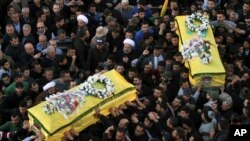After Israel allegedly killed senior level Hezbollah and Iranian officials in an attack in Syria earlier this week, analysts say it is not just regional tensions on the rise. The incident also highlights Iran's role in the Syrian war and other conflicts, alarming U.S. allies in the Middle East and potentially undermining confidence in Western policy.
After announcing an attack in Syria that killed 11 people, including leaders from Hezbollah and Iran’s Revolutionary Guard, Hezbollah leader Hassan Nasrallah says his men are prepared to fight Israel any place, any time.
A senior lecturer in the Study of Islam and the Muslim World at King's College in London, Carool Kersten, says retaliation is expected.
“They have to do something. I mean they are one of the most powerful political actors in Lebanon, so they cannot stand by and do nothing," said Kersten.
Other analysts say the response from Hezbollah or Iran may be in the form of “psychological warfare,” raising fears without striking. Israel is bracing for a possible attack, closing roads and deploying soldiers to border areas.
But Chatham House Associate Fellow Nadim Shehadi, who is also director of the Fares Center for Eastern Mediterranean Studies at The Fletcher School at Tufts University, says this is old news.
Shehadi says more significant than raising tension is what the attack reveals about Hezbollah's alliance with Iran’s Revolutionary Guard, also known as the IRGC.
“The relationship between Hezbollah and the IRGC is a well established one, but this sort of flagrantly puts it to the forefront. They were there as part of the same team under Iranian command," said Shehadi.
He adds this relationship also exists in Yemen, Bahrain and Iraq, strengthening militant groups allied with Iran, the chief rival of U.S. ally and oil giant Saudi Arabia.
Shehadi says Western allies in the Middle East are uneasy, because the United States appears to be more accommodating to Iran before upcoming proposed nuclear talks.
“American policy of engagement with Iran ignores that there is a silent war that Iran is waging through the IRGC, the Revolutionary Guard, in the whole region," he said.
He explains the U.S.-led fight against the Islamic State is increasingly viewed as offering tacit support to Syria's Assad regime, which is allied with Hezbollah and Iran. And he says the U.S. failure to communicate with its allies about its evolving relationship with Iran is causing anxiety.
But Iran is widely expected to take a more “consensual relationship” with Western powers in coming years, says King’s College Department of War Studies professor Andrew Lambert. This change, he adds, could ultimately improve Saudi-Iran relations.
“If that happens, a lot of tensions in the Middle East will be released. The anxiety driving the Saudis will be tempered. We can start to anticipate a world in which these two countries can talk to each other as normal political operators," said Lambert.
Nadim Shehadi says for now, Western powers deal with Iran as both a “good cop” and a “bad cop.” The bad cop is the Revolutionary Guard, fighting Western interests in many countries. The good cop is what he calls Iran’s “smiling, tweeting mullahs,” who Western powers must deal with so they do not lose power to the bad cop.





